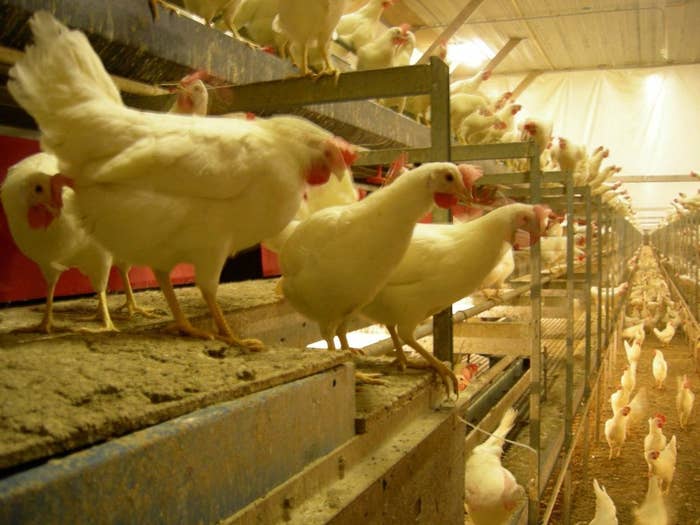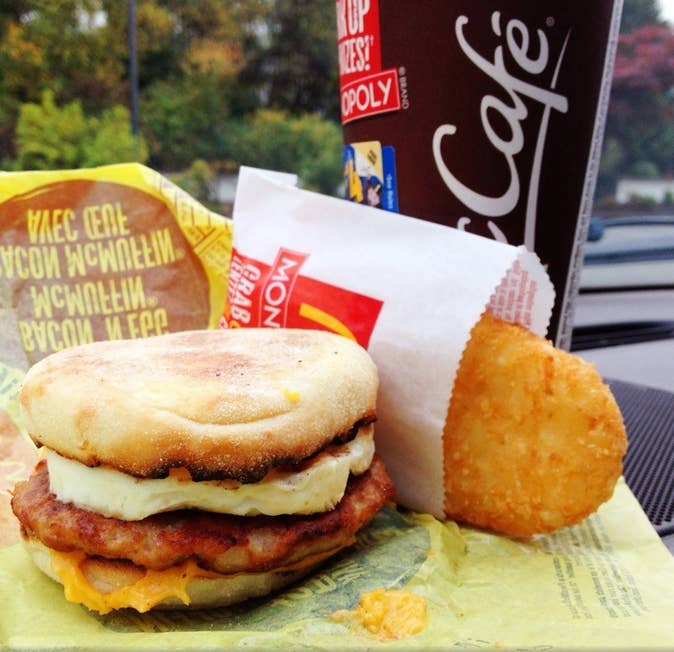
As it tries to reinvent itself as a "modern, progressive" fast food company, McDonald's will switch to cage-free eggs in the U.S. and Canada over the next 10 years.
The decision will affect the roughly 2 billion eggs the fast food chain buys in the U.S. annually, a number that is likely to grow as McDonald's begins serving more egg sandwiches as part of its all-day breakfast launch starting Oct. 6.
McDonald's has been buying some cage-free eggs since 2011, and already purchases more than 13 million cage-free eggs in the U.S. each year. But that is still less than 1% of the chain's domestic egg needs. It began talking to suppliers about going cage-free in the U.S. and Canada earlier this year.
"Cage-free" hens can roam freely through an open indoor barn, or a section of a barn, with multiple tiers. "There are no set times because they are always free to roam," said McDonald's spokeswoman Becca Harry in an email. In a cage-free environment, the hens are also debeaked, which means part of their beaks are removed in the first few days of life, as hens may peck at or cannibalize each other.
McDonald's suppliers follow United Egg Producers guidelines, which say cage-free birds must be uncaged, but may be kept indoors at all times, and that each hen must have at least 144 square inches of floor space. Caged hens typically get just 67 square inches of space per bird.
McDonald's egg suppliers are currently at about 72 square inches, said Marion Gross, senior vice president and chief supply chain officer of McDonald's North America. Each cage-free egg costs roughly a penny more to produce than a conventional egg, according to the Humane Society of the United States, but McDonald's said it is not planning any menu price increases tied to this announcement.
Cage-free "doesn't mean 'cruelty-free' but it's a real improvement," said Paul Shapiro, vice president of farm animal protection at the Humane Society. "The birds can walk, spread their wings, perch, lay their eggs in nest, and engage in other natural behaviors."
Roughly 3.2% of hens in the U.S., or about 9.6 million hens, were cage-free as of March, according to United Egg Producers, and an additional 3.2% were organic, which also has cage-free requirements.
In addition to "cage-free," there are other animal welfare standards for hens. According to the Humane Society, "free-range," "pasture raised," and "organic" labels on eggs mean the hens are granted outdoor access — unlike their "cage-free" counterparts — although their beaks may also be trimmed.
McDonald's joins a growing list of companies that are switching to cage-free eggs. In 2012, Burger King committed to using 100% cage-free eggs and pork by 2017; Hellmann's Mayonnaise maker Unilever set a goal for 2020; and the large food service companies Aramark, Sodexo, and Compass Group made cage-free commitments by 2019 or 2020 as well. This summer, General Mills also said it would stop buying eggs from caged hens in the U.S., although it did not provide a timeline.
A decade is a long time for McDonald's to make the switch, but "we're a big supply chain," said Marion Gross. "It's not something that can be done overnight."

Facing years of disappointing domestic sales that have forced it to close restaurants, McDonald's has been working to improve consumer perception of its food as part of its turnaround plan. The effort to change perceptions includes sourcing chicken raised without antibiotics that are important to human medicine by 2017, and serving milk from cows raised without artificial growth hormones this year. It also switched from using margarine, which has become less popular, to butter on bread for breakfast.
Competitors such as Chipotle have launched successful marketing campaigns around their ingredients and animal welfare standards. McDonald's has been making more announcements about its ingredients standards since its new CEO Steve Easterbrook stepped in this past March.
Last year, McDonald's launched a food transparency campaign called Our Food. Your Questions in which it answers frequently asked questions.Those questions included "have you ever used so-called 'pink slime' in your burgers?" (The company responded, "Yes, we used Lean Finely Textured Beef between 2004 and 2011. We do not use this today.") Another question: Do you use real chicken in your Chicken McNuggets?" ("Absolutely we do.") The company said some consumers have also inquired about McDonald's egg standards.
"We're trying to respond to what our consumers' expectations are today of us and their food supply," said Gross. "Consumers are changing. It's about how we evolve to meet those changing customer expectations. We can't remain static and remain relevant to customers."
